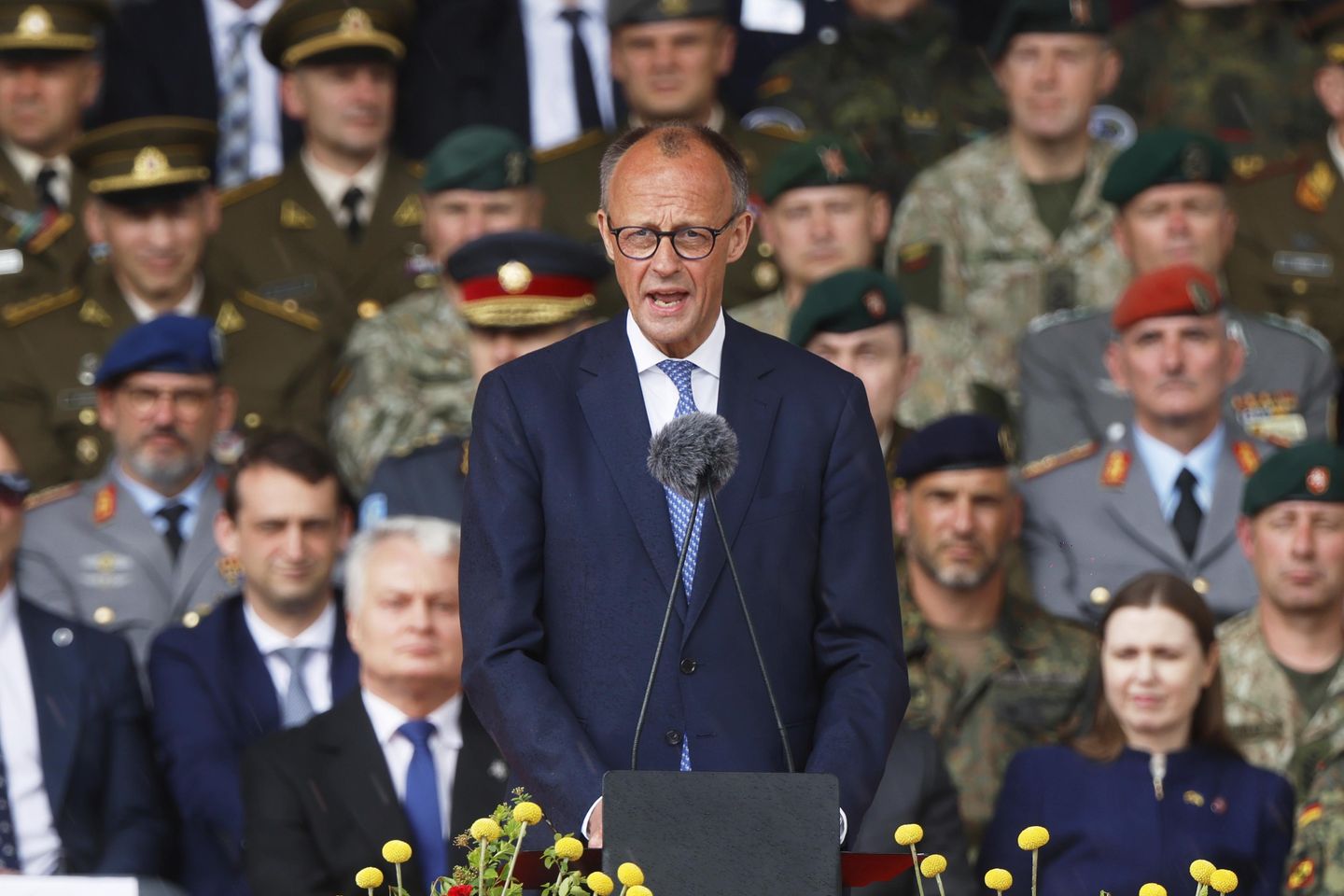
German Chancellor Friedrich Merz traveled this week to Lithuania to oversee the deployment of his nation’s first permanent foreign troop deployment since World War II, hoping to bolster NATO’s defenses against a combative Russia.
The chancellor, along with German Defense Minister Boris Pistorius, joined Lithuanian President Gitanas Nausėda at the launching ceremony for the 45th tank brigade on Thursday.
The new combat unit, formed at the request of Lithuania following Russia’s invasion of Ukraine in 2022, comprises 4,800 German service members and 200 civilian staff, and is scheduled to be fully operational by 2027.
The deployment is meant to shore up NATO’s defenses in the Baltic region, which includes Estonia and Latvia and share borders with Russia. Mr. Merz emphasized the importance of the NATO alliance during the launch ceremony.
“Together with our partners, we are determined to defend the alliance territory against any aggression. The security of our Baltic allies is also our security,” he said. “We stand firmly by Ukraine but we also stand together as Europeans as a whole and we play, whenever possible, as a team with the U.S.”
Mr. Nausėda expressed gratitude to Germany and the chancellor for their significant support of Lithuanian security, stating that Lithuania is confident it can confront threats in collaboration with its allies.
The deployment ceremony precedes next month’s consequential NATO summit at The Hague, where leaders are expected to discuss strengthening Europe’s defense industrial base and how to improve deterrence against future Russian aggression.
Both Mr. Merz and Mr. Nausėda reaffirmed their commitment to meeting NATO’s new benchmark of spending at least 5% of gross domestic product on defense.
President Trump has frequently criticized NATO leaders for not spending enough on defense, forcing the U.S. to pick up the slack. He has singled out Germany, Europe’s most populous state, as one of the worst offenders.
Germany’s previous government eventually met NATO’s 2% defense spending benchmark after allocating nearly $100 billion to purchase weapons. However, the Merz government wants to extend the nation’s debt cap to increase defense spending.
Mr. Merz, who wants to create Europe’s largest conventional army, predicts that Germany will reach the ambitious 5% spending benchmark by 2032.
“This is appropriate for Europe’s most populous and economically powerful country. Our friends and partners also expect this from us,” he said. “Indeed, they practically demand it.”
Other NATO partners that have pledged to increase defense spending include Sweden, Finland, Poland and Spain.





![CNN’s Jennings Roasts Biden's 'The View' Interview Defenders, Calls Out Coming Meltdown [WATCH]](https://www.right2024.com/wp-content/uploads/2025/04/Scott-Jennings-Wrecks-Former-Hillary-Spokesperson-with-One-Question-on-350x250.jpg)

![Frontier Airline Agents Fired After Video Mocking Passenger on Camera Goes Viral [WATCH]](https://www.right2024.com/wp-content/uploads/2025/05/Frontier-Airline-Agents-Fired-After-Video-Mocking-Passenger-on-Camera-350x250.jpg)
![Dem Rep Caught on Bodycam Physically Attacking Law Enforcement at ICE Detention Facility [WATCH]](https://www.right2024.com/wp-content/uploads/2025/05/Dem-Rep-Caught-on-Bodycam-Physically-Attacking-Law-Enforcement-at-350x250.jpg)

![Minnesota Officials Panicking Over Derek Chauvin Pardon Speculation, Potential Unrest [WATCH]](https://www.right2024.com/wp-content/uploads/2025/05/Minnesota-Officials-Panicking-Over-Derek-Chauvin-Pardon-Speculation-Potential-Unrest-350x250.jpg)






